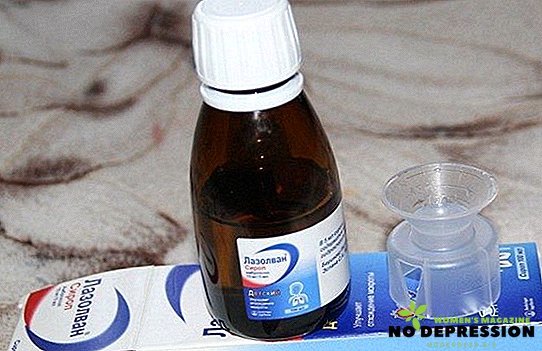Anyone can lay ears. Causes may be harmless and easily remedied, but congestion in the ears may be one of the symptoms of a serious illness.

Why lays ears: common causes
The ear is an organ with a complex structure responsible for the perception of sound and the balance of the body. Consists of the outer, middle and inner ear. Eustachian tubes connect the middle ear to the pharynx.
The most common reasons for laying ears:
- Atmospheric pressure drop - occurs at high altitude or depth, when driving at high speed or when moving on an elevator.
- Sulfur plugs - appear with the active formation of earwax, which forms the plugs that block the ear canal. They are not dangerous to health, are easily eliminated in a few minutes by washing.
- Water in the ear - in time, water not extracted from the ear can cause embedding. The reason is not serious, it is easily eliminated with the help of an ear stick and several actions aimed at moving water into the nasopharynx.

- Previously transferred otitis media (ear inflammation) - may be the cause of laying the ear, since this disease often leads to adhesions in the eardrum, which can only be identified by a qualified specialist.
- Sensory neural deafness is a weakening of the auditory function caused by damage to the auditory nerve due to insufficient blood supply. This disorder occurs in people with cerebral ischemia, hypertension, and head injuries.
- Eustachitis (inflammation of the auditory tube) - occurs against the background of colds, in the presence of polyps or curvature of the nasal septum.
- Allergic rhinitis - edema of the mucous membrane of the nasal cavity occurs, which leads to laying of the ears. Allergy can occur when in contact with an allergen (pollen, dust mite), with frequent use of vasoconstrictor drugs (Naphthyzinum, Nazivin, Nazol, etc.), when eating allergenic products (citrus, eggs, cocoa, honey, fish, etc. ).
- Vegetative vascular dystonia (VVD) - is the cause of blood pressure surges. Often occurs in pregnant women and adolescents due to hormonal changes and low hemoglobin levels.
- Narrowing or curvature of the ear canal - may be due to the anatomical features of the structure of the auditory organ of a particular person.
Rare diseases can cause the nasal congestion: sinusitis, acoustic neuroma, etc. These diseases can only be diagnosed in a medical institution, therefore it is best to consult a doctor if the ear becomes stuffy.
Causes of frequent symptom
The frequent occurrence of a symptom that causes constant discomfort is a reason to make an appointment with a doctor, as it may indicate a number of serious diseases. Finding the cause on your own will most likely fail, and self-treatment in this case can lead to negative consequences.
 Only a doctor can diagnose the cause and prescribe the appropriate treatment. Of course, the cause may be the usual overwork, but it is better to contact a specialist to rule out serious pathologies.
Only a doctor can diagnose the cause and prescribe the appropriate treatment. Of course, the cause may be the usual overwork, but it is better to contact a specialist to rule out serious pathologies.
The cause of the frequent manifestation of the symptom may be hypertension, which can lead to a heart attack, stroke, or separation of a blood clot.
It is important to be able to listen to the signals of your body, the main of which is pain.
A stuffiness in the ears, accompanied by dizziness, can be triggered by stress, an unbalanced diet, body intoxication, overheating in the sun, stuffiness.
Unilateral and bilateral congestion of the ear canal
Often a person can feel the congestion of both ears in the morning in the presence of non-treated colds of the nasopharynx, when mucus accumulates on the back of the throat during sleep. Then mucus enters the auditory tubes, blocking the passage of air.
 Immediately two ears can lay with a sharp jump in blood pressure or atmospheric pressure. But the cause can also be bilateral otitis. Often, children under three suffer from otitis.
Immediately two ears can lay with a sharp jump in blood pressure or atmospheric pressure. But the cause can also be bilateral otitis. Often, children under three suffer from otitis.
Pregnant women often complain of a feeling of congestion in the right ear. This symptom goes away after the birth of the baby.
A feeling of nasal congestion may occur when a foreign body enters the auditory course. This may be an insect that could crawl into the ear at night, especially if the night was in nature.
There may also be a sulfur plug in the ear or leftover water after bathing. Often, at once, two ears are laid while flying in an airplane or moving normally on an elevator or even in the subway.
What doctor should I contact if I have an ear and a headache
An ear laid and a headache — a fairly common occurrence that does not come about by chance. It is important to find out and eliminate the cause.
Older people often complain about the manifestation of these symptoms, especially after physical exertion and emotional overstrain. This happens in hypertensive patients - people with high blood pressure.
 In children and adolescents, this disease is rarely found mainly on the background of obesity. At risk are people who abuse smoking, alcohol, and fatty foods. Contribute to the development of the disease, stress and violation of sleep and rest.
In children and adolescents, this disease is rarely found mainly on the background of obesity. At risk are people who abuse smoking, alcohol, and fatty foods. Contribute to the development of the disease, stress and violation of sleep and rest.
Vegetative-vascular dystonia in the acute phase can cause these symptoms, especially if combined with inflammation of the cervical vertebrae.
If headaches, dizziness, nausea, blackening of the eyes and congestion in the ears appear regularly, then a therapist should be visited as soon as possible.
With the constant occurrence of headache, dizziness, shortness of breath, heart pain and ear congestion should consult a cardiologist.
A simple cold can also cause these symptoms. The nose is stuffed up, but not enough oxygen is supplied to the lungs and the brain, which causes headaches and congestion in the ears. In this case, you should seek help from an otolaryngologist (ENT).
Drug treatment of ear congestion syndrome
Since the causes of ear congestion may be different, the treatment is prescribed appropriate to them:
- vasoconstrictor drops, which for some time will remove the swelling of the nasal mucosa in the common cold (Tizin, Nasol, Naphthyzin, etc.);

- ear drops anti-inflammatory otitis (Otipaks, Otinum) and with antibiotics for severe cases (Sufradeks, Dexon);
- antiviral drugs (Rimantadine, Kagocel) accelerating the healing process for colds, edema decreases, ear congestion goes away;
- antibiotics for acute otitis media, inflammation of the facial nerve and other serious diseases;
- drugs that lower blood pressure in hypertension (Dibazol, Papaverine, Captopril, Losartan, Felodipine);
- drugs that normalize blood pressure and restore vascular tone in the IRR and Meniere's syndrome (Tonginal);
- drugs that increase blood pressure (Askofen, Ketorol, Ibuprofen);
- antihistamines (Citrine, Diazolin, Suprastin, Vibrosol) for allergic reactions leading to swelling of mucous membranes and ear congestion;
- alcohol drops for ears (Aurideksan) and alcohol compresses.
Makes ears: what to do at home
 First of all, it is necessary to understand what is the cause of ear congestion, and then proceed to eliminate the symptom.
First of all, it is necessary to understand what is the cause of ear congestion, and then proceed to eliminate the symptom.
If you feel a piercing pain in one or both ears and at the same time the body temperature is very high, immediately call an ambulance.
If you feel discomfort in the ear, and there is no possibility to get a visit to an otolaryngologist, use the following recommendations:
- Sulfuric cork is easily removed. To do this, drip a couple of drops of 3% hydrogen peroxide into your ear, and after a few minutes rinse the ear with warm water. If the cork still does not come out, it can be softened by dripping a few drops of warm oil (olive, almond, sunflower) into the ear. After a few minutes, the ear should be washed with warm water using a syringe or a large syringe without a needle. You can visit the sauna, take a bath or shower, because steam can also soften the cork. A special diet will help reduce the release of sulfur. Do not eat spicy, salted and smoked products. Better make a bias on vegetables. With the active chewing of fresh carrots, radishes, apples, sulfur plugs are destroyed. Do not wash your ear boric alcohol, which is too aggressive and can increase inflammation. It is impossible to pick out the cork with a sharp object, it can lead to injury of the eardrum.
 Mild inflammation and edema of the mucous membranes in otitis media and colds can be reduced by using decoctions of medicinal herbs (chamomile, sage, calendula) for rinsing and compresses. 2 tablespoons of dried herbs brewed in half a liter of boiling water and stand for 2 hours.
Mild inflammation and edema of the mucous membranes in otitis media and colds can be reduced by using decoctions of medicinal herbs (chamomile, sage, calendula) for rinsing and compresses. 2 tablespoons of dried herbs brewed in half a liter of boiling water and stand for 2 hours.- The ear build up with a sharp drop in atmospheric pressure is not a health problem, it can be eliminated using several techniques: yawn deeply; open and close the mouth several times in a row; suck on candy or chew gum; hold your nose with your fingers and blow the air until you feel cotton, then swallow several times.
- Water enters the ear - while swimming or diving this often happens. It is necessary to tilt your head to the side and pull the ear. If the actions did not help, you should hold your nose with your fingers and try to blow water out of the ear canal.
Remember, you can't buy health for money, so listen carefully to all the signals from your body and consult a doctor in time.
The following video very clearly shows why it can lay ears.




 Mild inflammation and edema of the mucous membranes in otitis media and colds can be reduced by using decoctions of medicinal herbs (chamomile, sage, calendula) for rinsing and compresses. 2 tablespoons of dried herbs brewed in half a liter of boiling water and stand for 2 hours.
Mild inflammation and edema of the mucous membranes in otitis media and colds can be reduced by using decoctions of medicinal herbs (chamomile, sage, calendula) for rinsing and compresses. 2 tablespoons of dried herbs brewed in half a liter of boiling water and stand for 2 hours.









